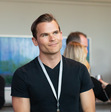Colin Robertson's Blog, page 2
December 8, 2016
From Failure to Freedom — How Perseverance Led to Breakthrough
"Success isn't final, failure isn't fatal, it is the courage to continue that counts." —Winston Churchill
Six months ago, I was down.
I gave everything I had to turn Willpowered into a sustainable business – and my rewards for the effort were:
A company doomed to failureThousands of dollars of debtAnd a spot in my parent's basement.Ouch.
Here's a graph showing my financial situation at the end of June:
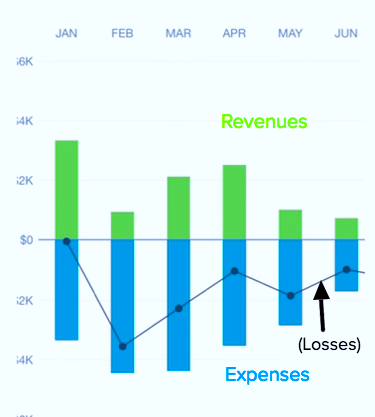
I endured months of losses, had no idea how to turn things around, and finally decided it was time to consider quitting.
But as I reflected on how far I'd come, and what I wanted to do with my life, I came up with the idea for Reverberation that would build off my work with Willpowered and help me achieve more than I initially thought possible.
So I let go of all distractions, fear of embarrassment and I got back to work.
Here's a graph showing what happened over the next five months:
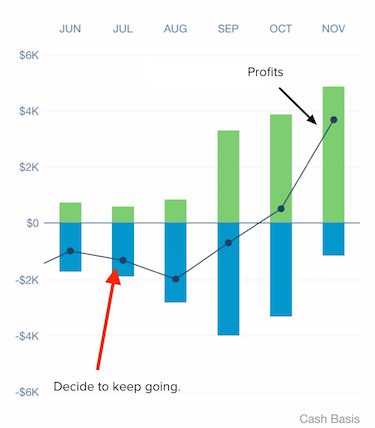
Here's the real surprise, though: that growth isn't from Reverberation...It's from "Wilson," an app I built with no coding experience, no degree, and no other options.
If I was going to save my dream, I needed help. Because I couldn't afford to hire an employee — I learned how to build one.
This post will tell you: What Wilson is, how he works, and why everyone reading this could do exactly what I did to build something like this.
WHAT IS WILSON?First off, Wilson is not artificial intelligence, he's not a robot, and he and I have a strictly professional relationship (Scarlett Johansson version not yet available).
Someone with no experience is not going to create the robots that take over the world.
Wilson is simply a database and a set of rules.
When he receives certain information, he runs scripted operations. That basic programming is all I can create myself.
He gets the information from over 30 apps I use to run my business.
This includes:
Quickbooks for accountingDropbox for file management Mindomo for mapping out my ideasPayPal & Stripe for processing transactions.ConvertKit for emailing subscribers.And much more. This image doesn't even cover all of them.

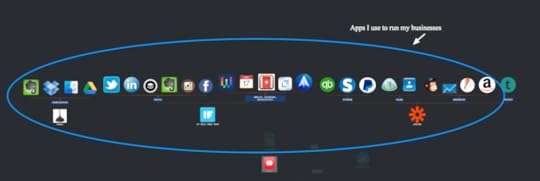
All of these apps have the ability to "talk" to each other through something called "API calls."
Through this process, Wilson can "check-in" and ensure all of those apps are doing their job — and notify me when they're not.
HOW I BUILT WILSON SO QUICKLYOn a very basic level, content creators have 3 jobs:
Create contentMarket contentBuild the businessAll of my worst periods were when these three factors were out of balance.
If I didn't write consistently, my content became stale.
If I didn't market effectively, I wouldn't drive traffic to the site.
And if I didn't analyze what was working, I'd write things nobody wanted to read.
So my goal was to build an app to handle steps 2 & 3.
Thus, Wilson's purpose was clear:
Publish content on various platforms like Twitter, Facebook, Emails, etc.Analyze top performing content and publishing platforms.Report back to me with recommendations.With that vision in mind, the learning path I needed to follow became crystal clear.
Rather than create Wilson from scratch to run every single operation in my business, I just needed to figure out how to get him to "talk" to apps built to perform those exact functions.
This was even easier than I anticipated.
Not only were there tools like Quickbooks that could handle all my accounting for me, but there were also those that could handle almost all of the API calls for me!
I didn't need to get Wilson to talk to all 30+ apps, I just needed to get him to talk to 3!
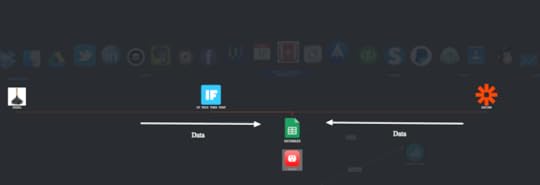
Zapier: Which handles sales, finance, accounting, and more complicated processes.
If This, Then That: Which handles marketing, social media, and emails.
Hazel: Which handles all file-sorting, task-management, and organizing data.
Because I knew the whole picture I was working toward, I saved weeks of time trying to build something from scratch or even learning how to do API calls to each app individually.
HOW I "TEACH" WILSON WHAT TO DOOnce the data is filtered into Wilson's database, he sends it to an analytics dashboard that I can see to check-in on things.
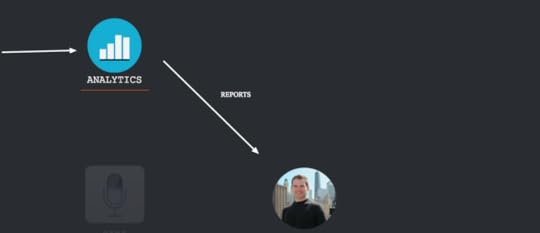
Then I sift through that information looking for useful insights about content, marketing, etc.
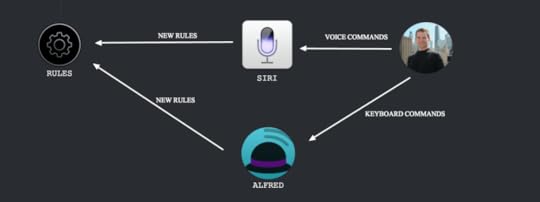
Then I "teach" Wilson how to interpret similar data so he can do it automatically next time.
Depending on whether I'm mobile or at home, I either use Siri (Apple's digital assistant) or Alfred (a tool designed for customizing commands).
With that overall idea mapped out in my mind, it was time to get to work.
HOW I SOLVED THIS PUZZLEIf I dumped out a box of 1000 puzzle pieces, how would you solve it?
Look online for "7 ways to solve a puzzle in less than an hour?"Try to come up with the "perfect plan" that will connect all the pieces effortlessly?Dig in until it started getting frustrating, then move onto a newer, more exciting puzzle?Or take one piece, look at the box, figure out where it fits, then do it all again?The right answer is clearly #4.
It's a no-brainer. No matter how big or complicated the puzzle, it can be solved by taking it one piece at a time — goals are no different.
No goal worth pursuing will happen effortlessly. (Anyone want to buy a 10-piece puzzle?)
Whatever your goal, you will face moments of stress, frustration, and boredom. There will be times when you're stuck, there will be times when you realize that you put a piece in the wrong place, and there will be times you wonder if this is really worth it....
But as long as you keep at it, the final picture will begin to take shape.
Entering September, I hadn't begun work on Wilson yet, and my finances were only worse.
At that point, even some of my strongest believers started to worry about me — especially when I responded to their concerns by stating my intentions to move to London.
I only sunk deeper — what right did I have to say I could make it to London?
It turns out, none. I won't be making it there by the hard deadline I set. But that deadline forced me to confront just how disorganized I was. It created the scarcity of time, and the necessity for Wilson.
So rather than putting the project off until later, it forced me to let go of distractions, and get him up and running.
This led to a virtuous cycle:
I added more tasks to his set of rulesHe took more tasks off my plateI had more time to add even more tasks to his set of rulesDo that every day and good things start happening. Whi yeahch is why the full system isn't even complete, yet it's still doing better than I ever could alone!
This system is full of issues, and I still have a lot to learn.
However, even this flawed system was enough to save me from failure, save me from doubts about "wasting my twenties," and save me from the endless worry about making next month's rent.
In it's place are the knowledge and skills to create a system that doesn't just save time or money — it creates them.
After six years of struggle, I solved the financial puzzle. Not through genius, luck, or even a great plan; but by solving one piece at a time.
CONCLUSIONAs I reflected on my journey, I realized what kept me going wasn't unshakable confidence, positive thinking, or visualization.
It was the pain I feel every time I see someone give up hope.
When we lose hope, we lose everything. We approach the unknown with fear, rather than curiosity. We close our minds and disregard anything we don't fully understand. We become angry and never get the courage to share our greatness with the world.
I genuinely believe that everyone in this world has the desire to become great at something they care deeply about — it doesn't matter if it's in science, sports, family life, whatever.
If that person realizes this purpose and discovers how it fits into something bigger than themselves, they will treat each day as an opportunity, not an obligation — and we all benefit from it.
Despite all my failures, I woke up each day with the idea that this was another opportunity to use science and technology to help every person achieve whatever greatness they seek. I
Time to take on the next puzzle...
From Failure to Freedom — How I Persevered Long Enough to Beat the Odds
"Success isn't final, failure isn't fatal, it is the courage to continue that counts." —Winston Churchill
Six months ago, I was down.
I gave everything I had to turn Willpowered into a sustainable business – and my rewards for the effort were:
A company doomed to failureThousands of dollars of debtAnd a spot in my parent's basement.Ouch.
Here's a graph showing my financial situation at the end of June:

I endured months of losses, had no idea how to turn things around, and finally decided it was time to seriously consider quitting.
But as I reflected on how far I'd come, and what I wanted to do with my life, I came up with an idea that would build off my work with Willpowered and help me achieve more than I originally thought possible.
So I let go of all distractions, free time, and fear of embarrassment and got back to work.
Here's a graph showing what happened over the next five months:

Here's the real surprise: that growth isn't from Reverberation — it's from an app I built in a beginner's software development course. I took the course to learn how to build an app to save me a few hours on menial tasks...
...I ended up building one that will save me decades of time over the course of my life.
Here's are the key decisions I made to go from failure to freedom.
#1. Why I decided to "GET BACK IN THE RING"At some point in your life, I'm sure you've been in a similar position to me.
It was time for the "next step" in your life, and you asked yourself,
"What do I do now?"
These decision set the course for our entire lives – yet, they are the hardest to answer.
No matter what path you choose, it's impossible to know whether or not it's "right" until you've experienced it for weeks, months, or even years. This uncertainty can leave you feeling completely overwhelmed, stressed, and afraid of making a mistake.
So instead of asking yourself, "what do I really want in life?"
You'll likely turn outward and ask, "what should a person like me do in a situation like this?"
To see this rule in action, think back to a social event where you didn't know many people.
Did your intuition motivate you to "be yourself," or to "blend in?"
This motivation is human. Getting "in with the tribe" means:
SafetyReproductionFoodSurvivalHowever, when you turn outward for the answer, you don't ask the hard questions about what you really want out of life — and you ignore the unique experiences and development that help you stand out from the crowd.
When I faced this decision, I reflected on my own experience, passion, and purpose in life to find the right answer.
This doesn't mean I ignored the advice of my inner-circle, I simply took each person's advice within the perspective of their unique experience, passion, and purpose in life.
When my friends, family, and the rest of the outside world looked at my progress over the last six years, they could only see "an egg." I hadn't accomplished much, I was clearly making less progress in life than others my age (I mean, I was living at my parent's place) .
But on the inside, I was learning and growing in ways they couldn't see. I learned a lot about the market, the tools available, and most importantly, how much I truly believed in my work, and what I was willing to sacrifice to keep it going.
I call this The Egg Fallacy — taken from Jim Collins' book Good to Great. We allow the outsider's perspective to influence our decisions much more than we should. Even those closest to you still don't have a clue about what is and isn't possible for you.
I was on the verge of "breaking through the shell," and if I allowed the outside world to influence my decision, I would have thrown away years of progress.
#2 HOW I TOOK ON EACH PROBLEMIf I dumped out a box of 1000 puzzle pieces, how would you solve it?
Look online for "7 ways to solve a puzzle in less than an hour !"Try to come up with the "perfect plan" that will connect all the pieces effortlessly?Dig in until it started getting frustrating, then move onto a newer more exciting puzzle?Or take one piece, look at the box, figure out where it fits, then take another piece?The right answer is clearly #4.
It's a no-brainer. No matter how big or complicated the puzzle, it can be solved by taking it one piece at a time — goals are no different.
No goal worth pursuing will happen effortlessly (ever buy a puzzle with only 10-pieces?).
Whatever your goal, you will face moments of stress, frustration, and boredom. There will be times when you're stuck, there will be times when you realize that you put a piece in the wrong place and you need to take a step back.
But as long as you keep at it, the final picture will begin to take shape.
At that point, it may start getting harder, but you will begin to enjoy the process for its own sake. Before you know it, you have a completed puzzle, a small win under your belt, and the confidence to take on a 2,000-piece puzzle next.
The real factor that led you to success wasn't any one puzzle you solved, or best practice you used. It was the combination of all of them! And the will to push through the feelings of boredom, and frustration until you realized, "I got this."
As I approached the next decision, I was well into building my puzzle.
#3 HOW I LEARNED TO "BUILD AN EMPLOYEE"Despite all my willpower, I learned quickly that I wouldn't have time to run Willpowered while getting Reverberation off the ground.
So I mapped out all my tasks with Willpowered and circled each one that didn't require me.
The list included:
MarketingSocial mediaAccountingSalesFact-checkingAnalytics......essentially everything except creating content — which is my real value to subscribers.
However, I couldn't afford to hire anyone. I only had 2 months of cash left, and would need to pay the employee a real wage — which I hadn't even taken in almost a year.
So I went back to the drawing board to re-think things.
By this point, I've learned from experience that if you believe in what you're doing, you will find a way to make it happen.
I couldn't hire an employee, but perhaps...I could build one...
I had zero programming experience when I began this project in June. However, running an online business allowed me to see the industry create simpler and cheaper tools to help beginners like me get started.
I hadn't started the "programming section" of the puzzle yet, but I had conquered other unknown sections, such as writing, before, so I knew I could learn it if I just kept at it.
However, the reason I picked it up so quickly is because I clearly saw how this section fit into the whole picture of what I was working toward.
#4 HOW I LEARNED SO QUICKLYOn a very basic level, content creators have 3 jobs:
Create contentMarket contentDo each better next timeAll of my worst periods were when these three factors were out of balance.
If I didn't write consistently, my content became stale.
If I didn't market effectively, I wouldn't drive traffic to the site
And if I didn't analyze what was working, I'd write things nobody wanted to read.
So my goal with the app was to handle steps 2 & 3.
Thus, the app's purpose was clear:
Publish content that I create on various platforms like Twitter, Facebook, Emails, etc.Analyze what articles work and where to publish.Report back to me with recommendations about what to create nextWith that vision in mind, the learning path I needed to follow became crystal clear.
Because I knew the whole picture I was working toward, I could clearly see my progress, and how each piece fit.
Learning without a vision is like putting together the puzzle without seeing the picture on the box. It's certainly possible, but it will bring unnecessary frustration, wasted time, and doubts about how much progress you're making.
Those factors may just be enough for you to give up on it...
#5 how i persevered through the painEntering September, I'd only dug myself deeper.
At that point, even some of my strongest believers started to worry about me — especially when I responded to their concerns by stating my intentions of moving to London.
They were flabbergasted — and certainly deserved to be.
I only sunk deeper - what right did I say I could make it to London?
It turns out, none. I won't be making it there by the hard deadlines that I set — but that deadline helped me discover what I was truly passionate about as I pushed myself further than I knew was possible.
I learned that my passion isn't fueled by positivity or optimism, it's fueled by the pain, anger, and sadness I feel every time I see people give up faith in themselves, faith in others, and especially faith in the principles they hold dear.
I won't claim to be self-less, but what kept me going through all the failures, all the self-doubt, and all the long nights of beating my head against the wall, was not fame, fortune, or the freedom to travel the world.
It was my belief in the greatness within every individual. That deep down, everyone has the desire to become great at something they care deeply about — it doesn't matter if it's in science, sports, family-life, whatever.
If that person realizes this purpose, and discovers how to fit it into the world, they will treat each day as an opportunity, not an obligation — and we all benefit from it.
All the doubts, embarrassments, and failures were painful. But I woke up every morning with the idea that today was an opportunity to use science and technology to help every individual achieve whatever greatness they seek.
More than any strategy, tip, or best-practice; it is my genuine belief in that purpose that kept me in the game long enough to free my mind from the worries of making rent, and free my time to do what I really love to do with Willpowered — write.
But this was j. As Churchill said in his famous quote:
"Success isn't final."
Time break out the 2,000-piece puzzle.....
November 24, 2016
How I Learned to Confront the Brutal Facts.
Facts.
When I was a teenager, there were few things I feared more....
Not because of school work, but because they were a reminder that I was not the person I aspired to be.
I've always been a dreamer. Thinking big, taking risks, and fear of the unknown have never been a problem.
IGNORING THE BRUTAL FACTS
My problem is getting my ability to keep up with my aspirations — and admitting the hard facts along the way.
Nowhere was this more apparent than when I moved to the US at 14.
I arrived in Omaha, Nebraska, at the agree of 14 with a dream of playing in the NFL. Like usual, nobody understood why I was doing it.
I was merely average on my Canadian team where the caliber of players doesn't even come close to America. On paper, I didn't have a hope of even getting playing time — let alone going pro.
To me, however, the choice was obvious — I would never make it to the NFL playing in Canada. So if I wanted to try, this was my only shot. Thus, I arrived with nothing but hopes and dreams...
Then I met reality. Otherwise known as "DJ Jones" a real future NFL player — who usually had a running start at me.
For those of you unfamiliar with high school football in the U.S., each school has a varsity and junior varsity team. The better players play on the varsity team...
I was on junior varsity. But I didn't start, I wasn't the backup, I was the backup’s backup!
My role on the team was to be a tackling dummy for the varsity team.
They needed players to practice against without worrying about injuring them. For the next two years, I was their guy.
So much for my dreams of the NFL...
DECISION
At the end of the season, I had a tough decision.
Is it worth it to play again next year?
On paper, the decision didn't seem too hard:
My best friend just quit.
I had no realistic shot at a starting position.
We just finished our second consecutive losing season and hadn't won the State Championship since 1983.
I had a job, girlfriend, and college to prepare for.
The information was clear: "Quit!"
But was I ready to give up on my purpose of me moving to the US in the first place?
Was I just going to throw the last 2 years of pain out?
Or did I have what it takes to prove that I can play with the best?
It wasn't easy...but I decided to finish what I started. It was the best decision I've ever made.
Over the next year...
I earned a spot on the team
I started every game
Our underdog team upset the state and won the championship
And I learned the fundamental principle at the base of my philosophy toward life since
"Confront the Brutal Facts, Yet Never Lose Faith."
CONFRONT THE BRUTAL FACTS
This was not an easy principle for me to grasp.
Throughout high school, my denial of any facts that didn't match with my dreams led me to become a compulsive liar.
I lied to my parents... I lied to my friends... But mostly, I lied to myself.
At the root of my dishonesty was having these big dreams, not having the ability to reach them, yet refusing to give up.
I felt like I needed to constantly justify why I took huge risks and stuck with them.
Without good answers, I exaggerated, misled, or outright made up stories to justify my decisions. Lying became so habitual that I was halfway into a lie before I even realized what I was doing.
It was just a part of life — and it made me miserable. Nobody could trust me, and I couldn't trust them.
When you're lying to everyone, you believe everyone else is lying to you. This leads to a cycle of mistrust, lies... you get the picture.
Luckily, that started to change when I finally had face facts.
This was the first time I could not ignore the facts, If I wanted to reach my goal, I could no longer lie to myself.
Which is why the first fact I faced was...
BRUTAL FACT #1: Self-Awareness Is the First Step Toward Self-Improvement
Self-awareness is the most underrated aspect of working toward any goal. Simply being honest about how much I was exercising didn't allow me to cut corners anymore.
Similarly, rather than trying to defend my weaknesses, I started seeing them for what they were —- problems in need of a solution.
Some I could fix quickly, (like studying offensive formations) some would be much harder (like improving my speed). Being "okay" with my weaknesses started a fundamental shift in how I saw the world.
When I could admit I wasn't as strong or fast as my teammates, I realized that I had a big advantage over them in playing disciplined. I still wasn't the best player, but I was dependable and consistent.
That's what ultimately landed me the starting role.
Most people do their best to ignore the hard truths of their situation because they believe it will lead to even scarier facts hidden underneath.
By thinking this way you will miss out on all of the positive things you'll find out about yourself or others in the process of owning up to your mistakes and learning from them.
If you have a brutal fact that you've been ignoring, ask yourself what positive findings may come from "pulling back the curtain."
BRUTAL FACT #2: Exaggerating Diminishes Your True Accomplishments.
When I held up the championship trophy after such a long, hard journey; I realized that by exaggerating, I disrespect the real hard choices that went into that achievement.
Exaggerating sends the message that "I don't believe I've accomplished enough in my life to be worthy of your approval, but maybe adding this on will make up for it."
If you're ever tempted to exaggerate, try to think about what you're hoping to achieve from doing so — why do you believe this person will like you more if you exaggerate rather than tell the truth?
Don't judge yourself for the answer, just clarify it.
You'll be surprised how effective this exercise is, and how silly your answers will sound.
BRUTAL FACT #3: The Only Truly Bad Decision Is One Made Out of Denial.
If you look back on the key decisions in your life, you'll notice there weren't many between a good and bad option. After all, in those cases, it's not much of a decision.
Instead, we face a never-ending series of compromises and tradeoffs from having many good options in one case, and many bad options in another.
Unfortunately, we all face choices that may hurt someone we love — like choosing to leave home in pursuit of a dream.
Or whether or not to give up on that dream when it feels like nothing is working out the way you hoped.
In these cases, there really is no "right" decision.
Maybe I would have been better off staying in Canada.
Maybe I would have discovered my passion for science and entrepreneurship if I didn't play my senior year.
Who knows?
Who cares?
The only decisions I regret are those where I lied to others, lied to myself, or simply ignored the facts I didn't want to hear.
Life is not a math exam. There are very few absolute answers. We all struggle with making the right decision — because none of us know what it is!
Some of your decisions may hurt people but that doesn't mean they're wrong, and you should feel guilt or regret.
More important than whether a decision might hurt someone is choosing to respect that person with the honest truth of the situation — especially if that person is you.
In those moments, you must become aware of the situation and ask yourself — are you being honest with the respect they deserve?
BRUTAL FACT #4: Never lose hope.
In November of my junior year of high school, things looked bleak.
Despite all my ambition, I was a terrible football player, on a mediocre team, and lied to myself and others in order to justify myself. I was completely miserable.
Looking back, though, I'm incredibly grateful that things were so bleak. Because it taught me that even if everything seems to be working against you, and your world seems hopeless...
You not only have the power to get back on your feet, but achieve far more than many thought possible.
To do so, however, you must be willing to confront the brutal facts.
Today, I see fear, anger, and hopelessness from people all over. But far more troubling is our unwillingness to face the brutal facts of our reality — both good and bad.
The world is changing — rapidly. Change scares us because it's unpredictable. We don't know how to act today to protect ourselves tomorrow.
This natural fear will be our default response if we aren't willing to ask,
"why?" and confront each fact we find buried underneath.
If you look at the major changes over the last 50 years, you'll see that the changes aren't coming from multinational companies hell-bent on taking over the world.
They're coming from individuals all around the world who now have the ability to open a laptop and access the knowledge, skills, comminities and even funding necessary to make their dreams a reality.
I am deeply grateful for all the dreamers that came before me that allowed me to do just that — and equally saddened to learn that only 21% of 18-29 year olds are hopeful for the future.
When we ignoreg the brutal facts, we never find the facts that will give us hope.
##4 BRUTAL FACT #5: The Truth Needs Our Help.
I wrote this post because I wanted to share my struggle to confront the brutal facts — and how they set me free.
You would not be reading this article right now if I hadn't confronted the brutal facts, yet never lost faith.
10 years ago it was to play another year of football.
5 years ago it was to start my first restaurant marketing startup.
3 years ago it was realizing I was in the wrong industry.
2 years ago it was starting Willpowered.
And year ago it was accepting the fact that at the age of 26 I had to move back in with my parents.
I'm comfortable telling you all this because I'm not ashamed of any of it. Last year I faced a choice that would have been difficult for a lot of people — it's a sign that "you failed."
To me, it was obvious — giving less than everything I have to something I truly believe in isn't an option.
As far as I'm concerned, quitting, going part-time, or any other derivative would be quitting on every person who has supported my work, and every other dreamer who could use more willpower to persevere through whatever problems they face.
So, if I only gave you the "truths" that made me look smart and successful, then I would be quitting on the value that allows us to trust each other and work together to overcome the real problems ahead.
It's uncomfortable being vulnerable, but it's painful being dishonest.
CONCLUSION
"When you tell a lie, you put your poblemss in from you, when you tell the truth you put your problems behind you." — Rick Santino
Sometimes it is hard to face the truth.
It can reveal thing about yourself, your friends, or even the world that you don't want to know. But no matter how hard you try, it will rear it's ugly head in one way or another.
My greatest fear as we move forward as a society is accepting that "it's a fact-free world now — and there's nothing we can do about it."
This applies well beyond the political arena or fact checking in the media. First and foremost it begins with the person we see in the mirror.
We can fight all we want to keep fake news off of Facebook, but if we never accept the genuine, authentic, and flawed person we are today, we will conitnue piling on the problems for tomorrow.
October 27, 2016
Why a Small Change in Mindset Leads to a Drastic Change in Results
They were shocked.
The hotel maids – all who claimed to be the furthest thing from habitual exercisers – were learning how many calories they were burning on a daily basis.
Compared to a desk job, hotel maids are quite active. The scrubbing, vacuuming, and walking from room-to-room isn’t exactly "intense," But over the course of an 8-hour day, the movement adds up.
In fact, it adds up to over 900 calories! 1
I don't know about you, but that's more than even I burn on a daily basis. However, 1/3rd of hotel maids believe they get don't get any exercise!
This stat made researchers wonder — if the maids change their mindset, would they change their behavior?
A CHANGE IN MINDSET
To find the answer to their question, researchers gathered the employees of several hotels and separated into two groups.
One group learned the facts about their daily exercise. They received lists with how many calories each part of their job burned – from folding towels to changing the bed.
The second was the control group. They received no exercise information so researchers could compare the difference in understanding of the facts.
After four weeks, without any instructions to diet or change their behavior, the maids who knew the facts started losing weight — while the other group remained stagnant.
By changing their mindset Toward their daily tasks, they recorded seeing their work as good for their bodies better than hard on them.
Over time, this new attitude toward their work led to incredible improvements in their health, happiness, and fulfillment in life.
HOW YOUR MINDSET AFFECTS YOUR RESULTS
If this change in mindset seems heart believe, I don't blame you.
*If they're doing the same work, why does a change in attitude matter?
Are you trying to say that if I believe pizza is good for me, all of a sudden it will become healthy?*
Unfortunately, no.
Changing your mindset is not about magic wishes that come true.
It is about choosing to see the benefits from whatever challenge you're facing.
Both sets of maids were getting a lot of healthy exercise through their work. However, the ones who saw their job as good for their bodies reaped the full benefits. 2
Before the experiment, the maids saw themselves as lazy or hopeless when it came to exercise. After all, they could not summon the willpower to make it to the gym or go jogging after work.
And after burning through 900 calories, can you blame them?
Now they saw themselves as regular exercisers and started acting in turn.
They approached their work with more enthusiasm.
They started walking more.
*They began eating healthier.
With each day of work, they identified more with the regular exercisers they were in reality.
The other group of maids, however, just saw themselves as “working.”
This distinction is crucial.[3]
If you feel overwhelmed, it’s going to require a lot of willpower to overcome that perspective and take action toward your goals.
However, if you feel capable of handling the challenge, you will get an instant boost of willpower to rise to the occasion — as I learned two weeks ago.
HOW I CHANGED MY STRESS MINDSET
I felt paralyzed as I sat down and stared at the screen...
It seemed like no matter what I just couldn't keep up with my work. I was over- promising and under-delivering. I was barely sleeping, I was missing deadlines, and didn't know how I was going to handle this.
A downward spiral began as I had more work, less willpower, and less confidence in myself to get on top of everything.
The stress was mounting,
Then I read Kelly McGonigal's book, "The Upside of Stress," and everything changed.
Yes, that title is correct. Stress has benefits — plenty of them.
The stress response (a.k.a fight-or-flight) is your body's natural reaction to challenges. It provides you with energy, focus, and awareness of the situation to help you rise to the occasion.
These are all exactly what I needed to get back on track!
However, our typical mindset toward stress is anything but, "exactly what we need."
So when we feel the increased heart-rate, or rush of energy, we don't use it to our advantage. Instead, we try to fight it — and consider it evidence that we "don't have what it takes."
This is exactly how I felt.
Here's how things played out with a "stress is bad" mindset:
My body gave me a rush of energy and focus I saw it as a sign that I was incapable of handling everything
I spent time and energy trying to fight off the response that was providing me with more energy
With less energy, time, and adrenaline to meet the challenge, I cut back on sleep and other healthy habits
Which led to even less energy and more stress to fight off Not exactly a winning formula...
When I changed to a "stress is good" mindset:
My body gave me a rush of energy and focus
I saw it as my body helping me conquer the challenge
I used the stress response to focus on one task at a time, and stick with it until it was complete.
I used the time I previously spent fighting off stress to learn how to build an automation program to manage that task next time.
Which led to more time, energy, and sleep in the future.
The change was incredible. And the results have been exponentially growing every day since.
This made me realize, even if the evidence in Dr. McGonigal's book was proven false, the results from choosing to see the benefits in stress were real.
As real as the declining numbers on the scale for the maids.
CONCLUSION
Your mindset matters.
If you see yourself as an exerciser, it will require less willpower to act like an exerciser. If you see yourself as lazy, you will waste willpower just trying to prove yourself wrong.
That is why the right mindset is crucial — but it is only half the battle.
You can't have an "exercier's mindset" and expect to lose weight while laying on the couch. Remember, the maids were already active (900 calories per day!)
Their mindset changed their body's response to their daily activity and changed their behavior to eat healthier and get outdoors.
So find the benefit in any challenge you're facing.
No matter how hard, how stressful, or overwhelming it may be, you will always be more likely to learn and grow from it with the right mindset.
October 11, 2016
Scarcity: What It Is, When to Use It, and What to Watch Out For...
It's hopeless...
I thought as I was 20 days into my 30-day Kickstarter campaign, but barely raised half of my $12,000 goal.
How am I going to double the money with only half the time?!
I didn't know the answer, but the objective was crystal clear: 10 days, $6,000, and the fate of Willpowered hanging in the balance.
At that moment, I became hyper-focused.
I didn't have time to worry about things like sleep, fun, or even fear. My only concern was the mission and figuring out a way to achieve victory.
This focus was so powerful that I didn't even need the 10 days...I reached the goal in 5.
That is the power of scarcity. However, that power comes at a price.
What is Scarcity?Everyone reading this has probably faced a similar feeling of scarcity at some point in your life.
It feels like another "you" takes over. One who tunes out all distractions, becomes super productive, and makes the most of scarce resources like time, money, employees, etc.
Whatever scarce resource resonates most with you, the true measurement of scarcity isn't the lack of the resource itself, but the feeling that you don't have enough of it.
A dieter and non-dieter may eat the same food, but only the dieter will feel as if it isn't enough. The same is true for money, time, or even friendships.
You will not experience scarcity unless you feel it.
Advantages of Scarcity1. Focus:The key factor of scarcity is how it heightens your focus.
Beyond productivity, if you're gainfully employed and money is abundant, you don't need to focus on how much things cost. If you get fired, however, scarcity will be triggered and you will pay much closer attention to every expense.
2. PrioritizationDeriving from that focus, you will begin to prioritize much more effectively.
The unemployed will find what is worth spending her money on and cut back on excess.
The college student who consistently put off a semester-long project will suddenly find the discipline to say "no" to parties or TV binges when his deadline is imminent.
These may become habits that stick with you even after the period of scarcity.
3. CreativityOften, focus and prioritization aren't enough to Get us through scarcity. So we need to find ways to use resources more effectively.
As I write this, I am using a feature called "Hemingway Mode" which does not allow me to delete any lines until my first draft is completed.
I have a bad tendency of obsessing over each sentence, but because time is scarce for me, I need to focus on getting a rough draft done as efficiently as possible. Without that need to do more with less, I would waste countless hours continuing to obsess.
Disadvantages of ScarcityUntil recently, I believed in scarcity so much that I deliberately put myself in situations to achieve more with less – like I did with the Kickstarter. It's helped me a lot, and I see it as one of my main goal-setting strategies.
Unfortunately, new scientific research has forced me to rethink that mindset.
In their book Scarcity, Eldar Shafir and Sendhil Mullainathan illustrate how the advantages of scarcity can quickly turn negative – with serious consequences.
1. Mental BandwidthIf you have been on a diet, you know how food suddenly becomes top of mind.
You become overwhelmed with things like calories, carbs, meals, what you ate before, what you'll eat next, and what you need to do to justify indulging "just this once."
It is exhausting -- and now we know why.
The process of thinking about the scarce resource of food takes up mental resources and inhibits your performance on other tasks the same way talking on a cell phone inhibits your performance while driving.
If your stomach is growling, and you are trying to hold out for hours until your next "allowed meal" you will not be as focused at work, on your kids, or anything else besides that food.
At best, this will make the process of dieting a lot harder on both yourself and those around you. At worst, this will lead to ironic rebound.
2. Ironic ReboundNotice in the first point how the dieter was spending their mental resources focusing on food? In other words, focusing on the very thing they are trying to avoid?
This is the ironic rebound effect. Scarcity heightens your focus on the scarce resource. This can help you use it more effectively, but it can backfire easily.
Dieters can become more food obsessed.
Busy people can become disorganized.
Lonely people can become desperate.
When we become so focused that it becomes an obsession, we end up shooting ourselves in the foot.
3. Tunnel VisionAs I read this book, I saw clearly how I displayed all these traits during times of scarcity.
But why wasn't I aware of them until now? I pride myself on self-awareness, so how could I miss such obvious disadvantages?
Tunnel vision.
Again, the focus gained from scarcity causes you to dial in only on things that have to do with the object of scarcity.
During the Kickstarter...
I hardly exercised at all.
I completely forgot about appointments I set with friends and family.
And any thoughts of the long-term consequences of my decisions became irrelevant.
I only saw the goal and what I needed to do to reach it.
This tunnel vision goes beyond neglect; it can cause us to become downright foolish in our decision-making.
If a student is unprepared for a big test tomorrow, an all-nighter seems like a good idea -- even though she will be in an even worse position without sleep.
When you need to pay a bill you can't afford today, a payday loan can look attractive. One creditor is demanding payment within the tunnel, and this new creditor is safely outside of it...for now.
Before you think you are immune to the irrational decision-making of a college student or the cash-strapped, think back to the last time you justified skipping the gym, skipping your diet, or hitting the snooze.
None of these decisions are rational, but they make sense when we our tunnel-vision is focused on our need for rest, food, and sleep.
Optimizing ScarcityWhat do I do now?!
I wasn't ready to give up on scarcity as a useful strategy, but clearly these disadvantages can't be ignored.
So how do we get the benefits without the negatives?
The answer lies in a story from World War II pilots who were so sleep deprived that they accidentally lifted the wheels of the plane upon landing, rather than the flaps, and crashed onto the runway.
This was especially prevalent amongst bomber pilots who were crashing twice as much as fighter pilots. The Air Force was baffled.
Why are the bomber pilots making twice as many costly errors as fighter pilots?
The military suspected there must be something wrong with the pilots. So they immediately began work on training their pilots better, only recruiting the "best of the best," and demanding better quality education in America.
One man, however, didn't examine the pilots, he examined the environment.
He found that the controls of the two planes were very different --particularly the location of the control for the wheels .
For the fighters, the wheels were deliberately placed away from the flaps. However, for the bombers, they were right next to each other!
Sleep deprived and exhausted, the bomber pilots accidentally pulled the wrong lever, lifted up the wheels, and crashed the plane.
Once they fixed that flaw, the difference in crashes evaporated.
The Power of EnvironmentThink about how hard it would've been for the Air Force to implement all of their strategies for "better pilots" for their planes.
They would need:
Buy-in from training officers to adopt new plans.Support from Government officialsNew training of recruitment officers And a smaller pool of perfectly capable pilots to choose from.They would've spent countless weeks, months, or even years coming up with strategies and experiments to implement this plan and make their pilots "better."
Yet, all they need to do was change one control of the cockpit.
No buy-in, minimal funding, and once they did it, the problem was solved and they could focus their attention on much bigger issues.
The One and Out StrategyWhen we feel the pressures of scarcity, we typically blame ourselves for not being able to live up to the demands of the moment.
We try to fix "the pilots," rather than the cockpit.
While there are obviously things that you can be doing better, it's likely that somewhere in your environment there is at least one "design flaw" that can be altered quickly, simply, and drastically improve your results.
For example:
Keeping a food diary: Even without denying yourself any food, writing down what you eat works far better than a diet because food doesn't become scarce. You become smarter about your food choices, not obsessed with them.
Apps/Tools: Apps and tools that can increase your productivity, self-awareness, or organization require time and money to set up. But that initial investment can give you the benefits for months or years to come.
Reading the Manual: It's so easy to neglect the value of acquiring skills and knowledge that will help you reach your goal. But if you take the time to learn about nutrition, exercise, how to use an app, etc. you will get infinitely better results.
These are all examples of what I call the "One & Out Strategy".
They require you do something once to set yourself up for success. After which, you can let it out of your mind.
This can be something as simple as dedicating part of your paycheck to savings before you even see it. Rather than depositing 10% of your income every paycheck, you make that one decision and don't need to worry about whether you're saving enough.
Example from my life:
Getting out of bed in the morning is difficult –even for a morning person like me. So I bought Phillips Hue Lights and set them to turn on when my alarm goes off. And if I don't make it out in 10 minutes, they start blinking.
It's a lot harder to go back to sleep in a bright room, and a lot easier to get out of bed with a rush of adrenaline when the lights start blinking. I bought those lights once, and now I will save hundreds of mornings of struggle to get out of bed.
Whatever your goal, ask yourself:
What change can I make to my environment once that will free my time, money, or mental bandwidth for months or years to come?
CONCLUSIONPlaying with scarcity is playing with fire.
It Isn't comfortable, it isn't fun, and it can also have some real consequences. However, the focus, prioritization, and creativity that you get from scarcity has made it one of the cornerstones of my philosophy.
To use scarcity to your advantage, you must find the things in your environment that you might neglect due to "tunnel-vision." See if there is something you can do once, ensure you're on top of it, and let it out of your mind.
September 20, 2016
Read the Frickin' Manual
At 24 years of age, Mark Cuban was far from what many would call a success.
“I was living in a 3-bedroom apartment in Dallas. I didn’t have my own bedroom. I slept on the couch or floor depending on what time I got home.
I had no closet. Instead, I had a pile that everyone knew was mine. My car had the usual hole in the floorboard, a ’77 FIAT X19 that burned a quart of oil that I couldn’t afford every week.”
Until that point, Cuban was working exclusively in the service industry. His prospects were poor, and he was mostly coasting through life, until he landed a job with Your Business Software – the first software retail store in Dallas.
He was excited to start a job that may lead to a good career, but he was also concerned.
“I had never worked with an IBM PC in my life. Not a single time, and I’m going to be selling software for it.”
So Cuban decided to do his homework. Each night, he would bring home a different software manual and read it – no matter how late it was.
After weeks of reading the manuals, Cuban became the best salesperson on the team. He even knew more than his boss!
“Turns out not a lot of people ever bothered to RTFM (read the fricking manual), so people started thinking I knew my stuff.”
This small detail – reading the manual – turned out to be the defining characteristic that separated Cuban from everyone else; not just in the sales team, but also in the marketplace.
“I knew I would end up owning my own business someday, so I figured my challenge was to learn as much as anyone about all businesses.
I believed that every job I took was me getting paid to learn about a new industry. I spent as much time as I could learning and reading everything about business I could get my hands on.”
It was not talent, luck, or a genius idea that took Cuban to the top – it was this small detail of reading the frickin' manual.
“Most people think it’s all about the idea. It’s not. Everyone has ideas. The hard part is doing the homework to know if the idea could work in the industry, then doing the preparation to be able to execute on the idea.” [1]
FACE THE PAIN OF BOREDOM OR THE PAIN OF REGRETIf Cuban's success really is this simple, why aren't more people listening to him?
Because reading the manual is boring.
No matter how intelligent you are, nobody wants to pick up the boring textbook about Microsoft Excel and go through it step-by-step. Most of us would even choose an exhausting workout over that kind of torture.
But those who do find the willpower to understand the Excel manual have an advantage for life. They took the time to learn how to solve problems, while the rest of us try to work around them.
Giving them exponentially more time and skills to accomplish their goals.
This is a lesson that finally hit home for me.
LEARNING TO CODE THE RIGHT WAYIf you have worked in the technology industry over the last 20 years, you know the value of a talented engineer. Partly because they're the ones who actually build the products, but also because there just aren't enough of them.
This is completely ridiculous considering the value and almost assured high salary that come with the position. Plus, it is one of the few lucrative careers that anyone reading this has the tools and knowledge to begin working towards this very second.
The web is overflowing with online coding schools, forums, guides, etc. that are mostly all free and actually good enough to give you a "foot in the door."
There's only one catch – you have to read the manual.
Until 4 months ago, I'd tried to learn how to code several times. I would read a little bit, go through a lot of trial and error, and then give up after my enthusiasm dropped and my errors grew.
But this time, I was determined to learn, and willing to embrace the boredom.
So I started on lesson 1 on this site and took every boring step necessary to truly understand what I was learning.
Yes, it was hard...
It was tedious...
It was frustrating...
But it was worth it.
Learning basic code has made my life 10x easier. I've learned to automate literally hundreds of tasks, saving myself over 20 hours/week so far.
This article, for example, was completed in 2-3 hours less time than it used to because I built a customized app using Alfred -- an app that helps you automate your workday.
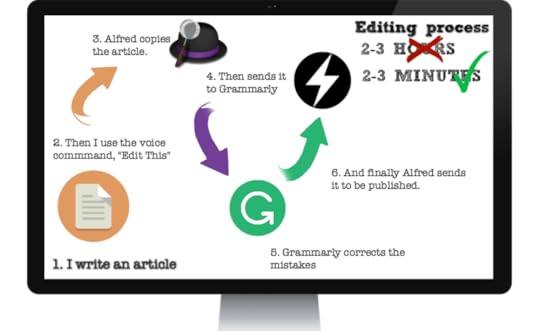
HOW TO FIND THE DISCIPLINE TO READ YOUR FRICKIN' MANUAL
Unfortunately, with my time split between 2 companies now, I don't have the hard scientific basis to answer this question that I usually do.
However, what helped me win my fight with boredom was clear – I had no other choice.
Scarcity is one of the most powerful strategies people rarely use. When you have a deadline, make a promise, or leave yourself no retreat, your brain stops focusing on distractions and starts focusing on solving problems.
And after I made a promise to some of my heroes of science to develop a platform specifically for them by the end of Q3, I had to get it done. I had to learn how to code, and code well.
This mentality has stuck with me every day since and only grows stronger as deadline day is less than 10 days from now. And my "problem-solver" is firing on every cylinder.
To illustrate what I mean, as of Monday I still had about 2 full days worth of mindless data entry before the product was fully operational...and I didn't have 2 full days to spend.
I stressed over this problem all of last week as I continued to put it off; hoping that I would find a solution...
Then at 3:30am on Monday, I did. That's right, it was in a dream.
I never thought that was possible before, but I shot out of bed, wrote a screen-scraping program to collect the data for me, and 2 days of boring, tedious work was accomplished in 30 minutes (plus I may never have to enter data again).
If you can create a situation where you "have to get it done" over the course of even just a couple of hours, those hours will pay you dividends for a lifetime.
CONCLUSIONSometimes success is boring. It's boring choosing a trip to the gym over a night on the town, it's boring choosing a salad over pizza. And it's boring reading the instruction manual instead of picking things up as you go along.
However, if you can embrace that boredom by reading the freaking manual you will set yourself apart from everyone else. It will pay dividends for years to come as you master the fundamentals and exponentially build your skills over your lifetime.
Sources:
Cuban, M. (2013). How to win at the sport of business: If I can do it, you can do it.Segerstrom, S., Hardy, J., Evans, D., Winters, N., Wright, R. (2012). How motivation affects cardiovascular response: Mechanisms and applications. , (pp. 181-198). Washington, DC, US: American Psychological Association, xiv, 424Read the Frickin' Manual.
At 24 years of age, Mark Cuban was far from what many would call a success.
“I was living in a 3-bedroom apartment in Dallas. I didn’t have my own bedroom. I slept on the couch or floor depending on what time I got home.
I had no closet. Instead, I had a pile that everyone knew was mine. My car had the usual hole in the floorboard, a ’77 FIAT X19 that burned a quart of oil that I couldn’t afford every week.”
Until that point, Cuban was working exclusively in the service industry. His prospects were poor, and he was mostly coasting through life, until he landed a job with Your Business Software – the first software retail store in Dallas.
He was excited to start a job that may lead to a good career, but he was also concerned.
“I had never worked with an IBM PC in my life. Not a single time, and I’m going to be selling software for it.”
So Cuban decided to do his homework. Each night, he would bring home a different software manual and read it – no matter how late it was.
After weeks of reading the manuals, Cuban became the best salesperson on the team. He even knew more than his boss!
“Turns out not a lot of people ever bothered to RTFM (read the fricking manual), so people started thinking I knew my stuff.”
This small detail – reading the manual – turned out to be the defining characteristic that separated Cuban from everyone else; not just in the sales team, but also in the marketplace.
“I knew I would end up owning my own business someday, so I figured my challenge was to learn as much as anyone about all businesses.
I believed that every job I took was me getting paid to learn about a new industry. I spent as much time as I could learning and reading everything about business I could get my hands on.”
It was not talent, luck, or a genius idea that took Cuban to the top – it was this small detail of reading the frickin' manual.
“Most people think it’s all about the idea. It’s not. Everyone has ideas. The hard part is doing the homework to know if the idea could work in the industry, then doing the preparation to be able to execute on the idea.” [1]
FACE THE PAIN OF BOREDOM OR THE PAIN OF REGRETIf Cuban's success really is this simple, why aren't more people listening to him?
Because reading the manual is boring.
No matter how intelligent you are, nobody wants to pick up the boring textbook about Microsoft Excel and go through it step-by-step. Most of us would even choose an exhausting workout over that kind of torture.
But those who do find the willpower to understand the Excel manual have an advantage for life. They took the time to learn how to solve problems, while the rest of us try to work around them.
Giving them exponentially more time and skills to accomplish their goals.
This is a lesson that finally hit home for me.
LEARNING TO CODE THE RIGHT WAYIf you have worked in the technology industry over the last 20 years, you know the value of a talented engineer. Partly because they're the ones who actually build the products, but also because there just aren't enough of them.
This is completely ridiculous considering the value and almost assured high salary that come with the position. Plus, it is one of the few lucrative careers that anyone reading this has the tools and knowledge to begin working towards this very second.
The web is overflowing with online coding schools, forums, guides, etc. that are mostly all free and actually good enough to give you a "foot in the door."
There's only one catch – you have to read the manual.
Until 4 months ago, I'd tried to learn how to code several times. I would read a little bit, go through a lot of trial and error, and then give up after my enthusiasm dropped and my errors grew.
But this time, I was determined to learn, and willing to embrace the boredom.
So I started on lesson 1 on this site and took every boring step necessary to truly understand what I was learning.
Yes, it was hard...
It was tedious...
It was frustrating...
But it was worth it.
Learning basic code has made my life 10x easier. I've learned to automate literally hundreds of tasks, saving myself over 20 hours/week so far.
This article, for example, was completed in 2-3 hours less time than it used to because I built a customized app using Alfred -- an app that helps you automate your workday.
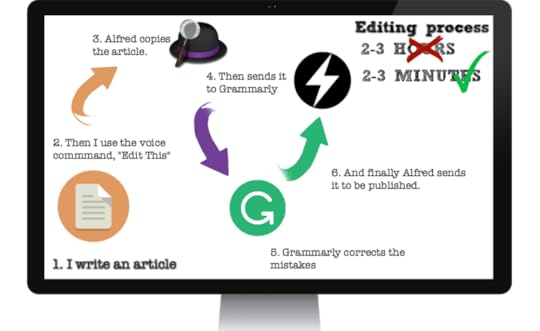
HOW to FIND THE DISCIPLINE to read your frickin' manual
Unfortunately, with my time split between 2 companies now, I don't have the hard scientific basis to answer this question that I usually do.
However, what helped me win my fight with boredom was clear – I had no other choice.
Scarcity is one of the most powerful strategies people never use. When we have a deadline, make a promise, or leave yourself no retreat, your brain stops focusing on distractions and starts focusing on solving problems.
And after I made a promise to some of my heroes of science to develop a platform specifically for them by the end of Q3, I had no other choice. I had to learn how to code, and code well.
This mentality has stuck with me every day since and only grows stronger as deadline day is less than 10 days from now. And my "problem-solver" is firing on every cylinder.
To illustrate what I mean, as of Monday I still had about 2 full days worth of mindless data entry before the product is fully operational. 2 full days that I don't have to waste.
I stressed over this problem all of last week as I continued to put it off; hoping that I would find a solution..and at 3:30am on Monday, I did. That's right, it was in a dream.
I never thought that was possible before, but I shot out of bed, wrote a screen-scraping program to collect the data for me, and 2 days of boring, tedious work was accomplished in 30 minutes – and I may never have to enter data again.
If you can create a situation where you "have to get it done" over the course of even just a couple of hours, those hours will pay you dividends for a lifetime.
ConclusionSometimes success is boring. It's boring choosing a trip to the gym over a night on the town, it's boring choosing a salad over pizza. And it's boring reading the instruction manual instead of picking things up as you go along.
However, if you can embrace that boredom by reading the freaking manual you will set yourself apart from everyone else. It will pay dividends for years to come to come as you master the fundamentals and exponentially build your skills over your lifetime.
September 12, 2016
My Planning Process for Achieving Unrealistic Goals
Over the last 6 years, I have deliberately put myself in "no retreat" situations.
I have moved to a new city, I have set a hard deadline, or signed up to do something out of my comfort zone. Whenever I'm becoming a big fish in a small pond with my personal development, I jump into a bigger pond – even if I'm not ready.
I've done this so often, in fact, that I developed a process that helps me achieve the "unrealistic" goals necessary to make it in the "bigger pond."
Right now, I have yet another unrealistic goal. So here is how I planned to achieve it:
Step 1: How Did I Get There?Visualize yourself having achieved your goal, but instead of the power of positive thinking method, don't just visualize how great you feel.
Instead, ask yourself:
What have you accomplished?What challenges did you overcome?Who helped you along the way?This simulation will help you identify the key points along the path from where you are to where you want to be.
*For help, this checklist provides all questions to ask yourself at this stage.
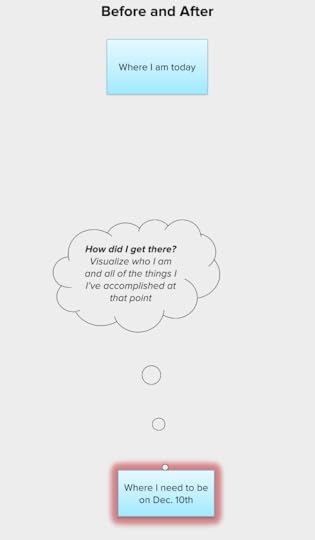
Step 2: Identify Milestones
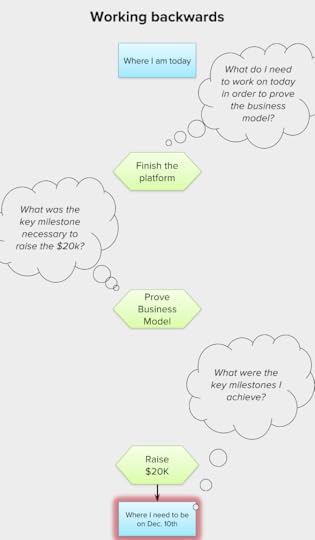
Working backward, identify the key milestones you reached between now and then.
Start with the milestone that “sealed the deal,” then ask yourself,
What major obstacle or challenge did I conquer in order for me to reach that final milestone?
Then repeat for as many key obstacles that occur from where you are today to your goal.
Step 3: Next Steps
Now, that we have an outline, it's time to connect the dots.
This round, you want to go more detailed and simulate each step you took to get the milestones.
Because it's more detailed this time, you want to Think about each step you took from where you are to the first milestone.
Then you can give an estimate of when you can complete those steps and hit the first milestone.
Repeat for each milestone.
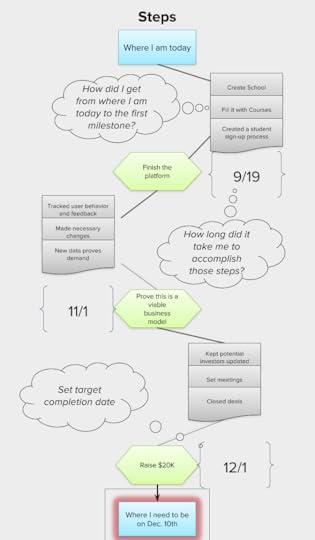
Step 4: How Did It All Go Wrong?
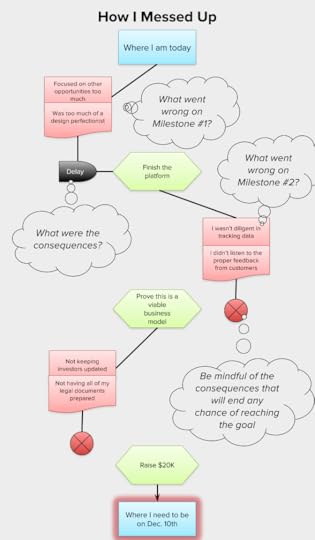
Now, it’s time to identify all the things that could go wrong.
This isn’t to make you feel bad about yourself, it’s to identify everything that you need to be mindful of going forward.
As an optimist, this is always the crucial step for me.
It’s far better to confront your weaknesses with calm, cool-headed planning, than when you’re tired and stressed from pushing your comfort zone.
Step 5: Break It Into Daily Goals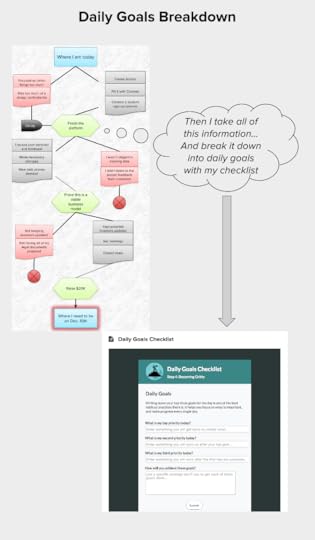
Conclusion
One of the most effective life strategies I've used is leaving "burning my boats" and forcing myself into difficult situations. Left with no retreat, your brain will switch from thinking about excuses, to thinking about solutions.
I haven't always been able to rise to the occasion, and failing in those situations hurts even worse than normal. That's why I've been developing a method to my madness to help me learn, grow, and increase my chances of success.
If you ever decide to jump into a "bigger pond" I hope it helps you do the same!
August 26, 2016
August 13, 2016
Drastically Improve Your Success by Starting Each Goal With Why
In 1813, Humphrey Davy – a prominent British scientist, and a member of the Royal Society – damaged his eyesight in an accident with nitrogen trichloride.
It was perhaps the luckiest accident in modern human history.
Davy would be blind for months and in need of a quality assistant. When thinking about whom he would hire, he remembered a young man named Michael Faraday who sent him a 300-page book of notes taken during one of his lectures.
If that boy could take such meticulous notes during a lecture, surely he would be able to take note of everything while Davy was unable to see.
In 19th-century England, hiring Faraday was a radical decision. He was merely a bookbinding apprentice, from a poor family, without any formal education.
So the idea of Davy, one of the most respected scientists in England, entrusting him to perform all the complicated Scientific duties necessary of a lab assistant was crazy.
However, trust him he did – and society will forever thank him for it.
Michael Faraday did not just prove his worth as a competent lab assistant; he became perhaps the greatest scientist of all time.
He was the first to harness the power of electricity and store it in a generator.
He created the first electric motor, which powered the 20th-century.
And his work laid the foundation for scientists like Thomas Edison, Nikola Tesla, and countless others to build the world we know today.
His list the contributions go on – and may never have happened without the luck of Davy's accident.
How many great leaders, geniuses, and individuals capable of changing the world will never discover the greatness within them simply because they never had that luck?
To me, this is the greatest tragedy in the world.
I know there are countless "Michael Faraday's" out there that are capable of building a better world for all of us, but the opportunity just isn't there for them.
Providing these people with that opportunity is my "WHY".
THE GOLDEN CIRCLEWhen setting a goal, whether it is to exercise this week, or change the world, there's a very simple formula we usually go through to achieve it.
We start with what we want to accomplish.We strategize about how to achieve it.Then if we are lucky, we find motivation when we think about why the hard work is worth it.In his book Start With Why, author Simon Sinek called this formula, "The Golden Circle."
In nearly every problem we try to solve, or goal we strive to achieve, we follow this formula.
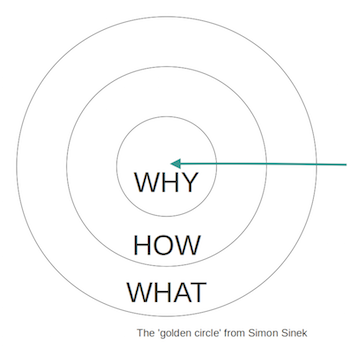
Unfortunately, we usually approach the golden circle from the wrong direction.
STARTING WITH WHAT
On the surface, starting with WHAT makes sense. Shouldn't you know what you want to accomplish before you set out to achieve it?
That is sound logic...if you actually know what you want.
Most people who set goals do not know why they want to reach that goal in the first place. So when they hit the inevitable hard days along the way, they do not have the inspiration to push their comfort zone and achieve an excellent result.
To see this for yourself, ask someone who sets a New Year's resolution to exercise 4 times per week why they want to start working out.
You will likely get a puzzled look, followed by, "Uh...to get in shape?"
In contrast, ask someone who just finished her first half marathon this year why she wants to exercise 4 times per week, and she will say confidently, "this year I am training for a full marathon."
The WHAT is the same, but the WHY is completely different.
Which is why we know she will finish that marathon, while millions of new gym members will not even make it to February.
the power of STARTING WITH WHY
“Hi Colin,
First of all thanks for your mail, but I cannot open your articles, I think this is banned in Sudan.
Please is it possible for u to find a way to provide me these articles through any other source? I do not want to miss them.”
My heart started racing when I received that subscriber's email at midnight on a Friday.
I was coming home from a night on the town, but became so fired up that I did not just send him all of my articles, I stayed up working until I physically could not stay awake any longer and fell asleep 4 hours later.
Not because I used a productivity strategy.
Not because I ate high-willpower foods.
And not because I was seeking wealth, fame, or adoration.
But because it was a reminder of my WHY.
I honestly believe that this subscriber could be the next Michael Faraday. I believe he and all the other people of Sudan have greatness within them – and it breaks my heart that they are denied access to information that might help them discover that greatness.
So I wake up every day inspired to change that. To provide them and every other person on this planet access to reliable, expert-quality information that will help them learn, grow, and reach their full potential.
With this as my WHY, I have been able to push my mind, body, and spirit further than I thought possible.
Whatever your goal is, first ask yourself "WHY?"Do you believe it will bring you happiness?
Do you believe it will benefit your family?
Do you believe it will make a positive impact on the world?
There are no right or wrong answers. What really matters is finding the WHY that will motivate you to persevere through all of the obstacles you will face along way.
Just remember that finding your why is merely the starting place.
WHY IS THE START, NOT THE FINISHStarting with why will inspire you to achieve goals, help you bounce back from failure, and might even give you the confidence to change the world – but you still need to put in the work.
Unfortunately, many people who start with WHY never figure out the HOW. They are the "dreamers" who never learn how to "do."
Here are 2 strategies you can use to ensure you're not one of them.
Find People Who Know "HOW"Walt Disney was once asked by a shareholder, "what would happen to Disney if he was hit by a truck?" His answer shocked the crowd.
“Absolutely nothing. My brother Roy runs this company. I just piddle around.”
He was not kidding.
Shockingly, Walt Disney was not much of a businessman. In venture after venture, Walt kept failing – and racking up a lot of debt in the process.
Eventually, Roy Disney had to step in and run his brother's company. It was clear that Walt had no plans of giving up, and Roy feared that Walt would be taken out by loan sharks without his help.
Walt Disney had a clear understanding of his WHY. He genuinely wanted to bring happiness and wonder to children. But to achieve a vision as grand as his, he needed to surround himself with people who knew HOW.
Track Your ProgressI may never succeed like Disney, but I am just as much of a WHY person as him.
I have always taken risks, followed my passions, and been able to see the greater purpose behind my daily actions.
But because my mind is on the grand vision, I usually gloss over the details.
This is why I could never figure out how to build Willpowered into a sustainable living. I was motivated by why I was creating content, rather than learning how to create more valuable content, or analyzing the business side of things.
To counteract this tendency, I need to track as much information about my progress towards achieving goals as possible. When the brutal facts are right in front of me, they're hard to ignore.
To track all my information, I use this checklist that you can download for free:

